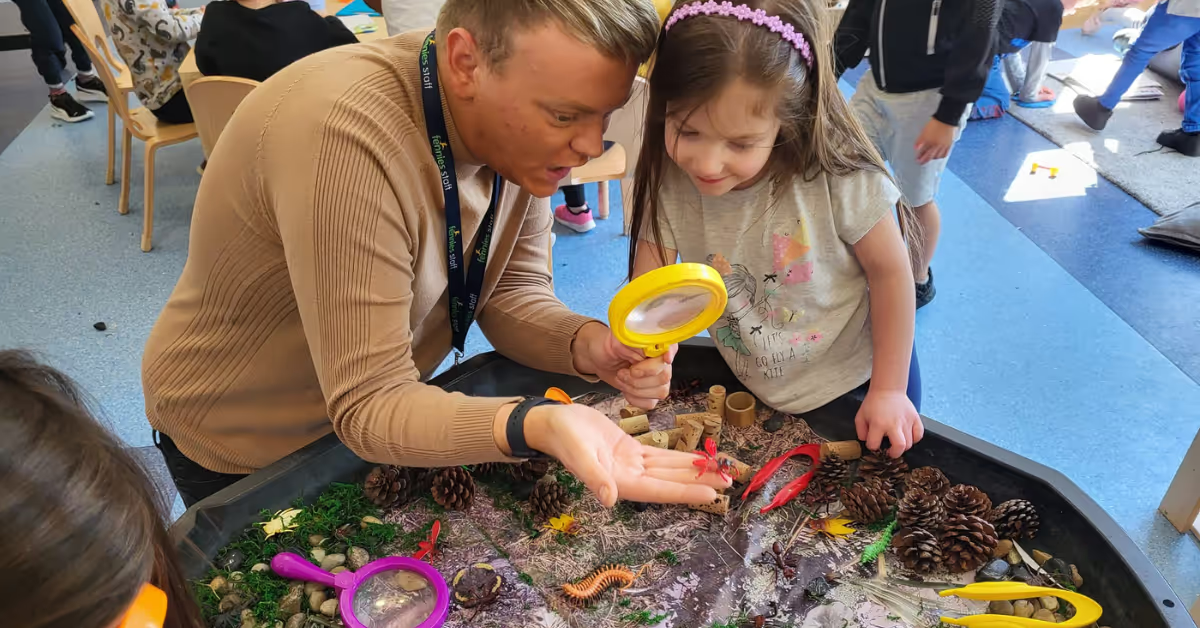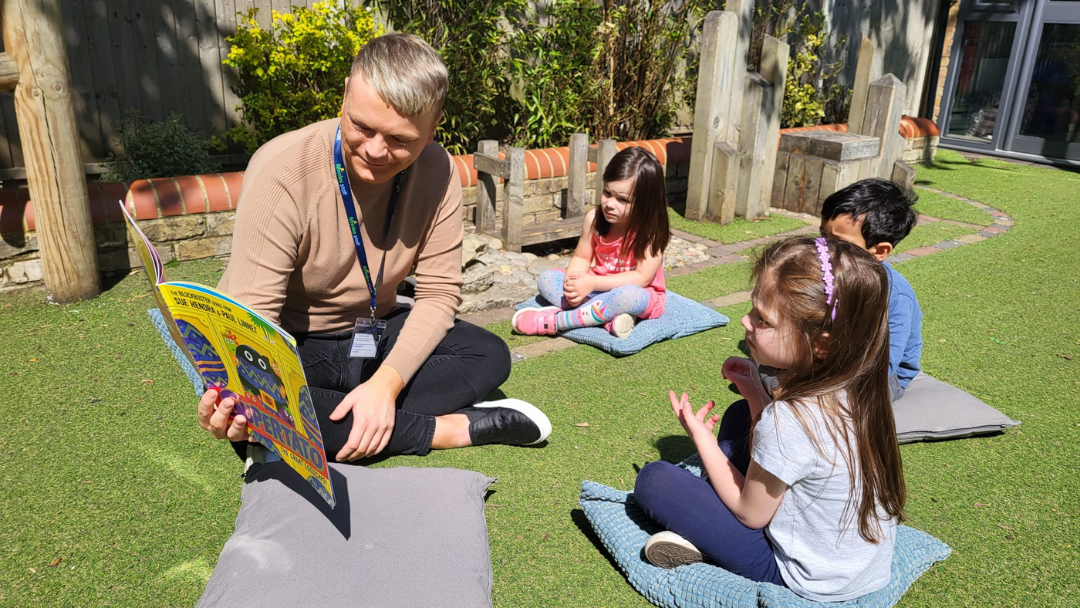Our Director of Early Years, Rageena, explores inspiration in early childhood education
In the domain of early childhood education, there is constant research to determine the best way to promote optimal learning and development in children under five years old.
As we define our approach to teaching, it is important to understand and apply scientifically grounded pedagogical methods that have been shown to enhance educational practices. Here I aim to delve into the concept of inspiration as a key factor in child development and effective learning, drawing on insights from prominent educational theorists and empirical research.
Theoretical Foundations
Jean Piaget's Cognitive Development Theory
Children benefit from hands-on experiences and interactions
Jean Piaget, a pioneer in developmental psychology, emphasised the significance of providing children with opportunities to actively engage with their environment. According to Piaget's theory of cognitive development, children construct knowledge through hands-on experiences and interactions with their surroundings. Piaget proposed that children progress through distinct stages of cognitive development, continually refining their understanding of the world. Central to Piaget's perspective is the idea that inspiring children with rich, interactive learning experiences promotes cognitive growth and lays the foundation for future learning.
Lev Vygotsky's Zone of Proximal Development (ZPD)
Children benefit from being stretched and challenged with adaptable levels of support to scaffold their learning.
Lev Vygotsky introduced the concept of the Zone of Proximal Development (ZPD), which outlines the range of tasks that children cannot yet perform independently but can accomplish with the guidance and support of a more knowledgeable individual, such as a teacher. Vygotsky's theory underscores the importance of providing appropriate challenges that stretch children's abilities while ensuring they receive the necessary scaffolding to succeed. By identifying and supporting children within their ZPD, educators facilitate optimal learning and development.

Attachment Theory by John Bowlby
When children feel emotionally connected to their teachers, they are more likely to engage actively in learning activities.
John Bowlby's attachment theory emphasises the significance of secure emotional bonds in early childhood. Bowlby suggests that strong attachments to caregivers serve as a foundation for healthy socioemotional development. In the educational context, fostering secure attachments to teachers is crucial for creating a supportive learning environment.
Erik Erikson's Psychosocial Theory
Children benefit from being afforded an appropriate level of independence.
Erik Erikson's psychosocial theory highlights the importance of autonomy versus shame and doubt during the early years. According to Erikson, children develop a sense of autonomy as they assert their independence and make choices about their activities. Encouraging autonomy allows children to develop a sense of agency and self-confidence. By granting children independence to choose activities within a structured environment, educators promote self-esteem and motivation, which are essential components of inspiration.
Urie Bronfenbrenner's Ecological Systems Theory
Children benefit from environments that promote independence and have a balance between stimulating areas and areas of tranquillity.
Urie Bronfenbrenner's ecological systems theory emphasises the interconnectedness between children and their environments. Bronfenbrenner identified multiple layers of influence, including the microsystem (immediate environment) and the mesosystem (interactions between microsystems). Creating environments that are balanced in terms of stimulation and tranquility is essential for promoting optimal learning outcomes. By considering environmental influences, educators can optimise learning environments to support children's development.

Psychological Insights into Inspiration
Intrinsic Motivation and Engagement
Inspiration sparks intrinsic motivation, which refers to the inner drive to learn and explore driven by personal interest and curiosity rather than external rewards or pressure. Self-Determination Theory (SDT), introduced by educational psychologists Edward Deci and Richard Ryan, underscores the importance of intrinsic motivation for sustained learning and well-being. When children are inspired, they are more likely to engage deeply with the subject matter, leading to better retention and understanding.
Emotional Connection and Brain Development
Neuroscience research highlights the role of emotions in learning. Inspiring experiences trigger positive emotions that can enhance memory formation and cognitive processing. Neuroscientist Mary Helen Immordino-Yang emphasizes the interconnected nature of emotion, cognition, and learning. When children are emotionally engaged and inspired, their brains are primed for optimal learning and brain development.
Growth Mindset and Resilience
Psychologist Carol Dweck's work on growth mindset underscores the importance of inspiring children to embrace challenges and view failures as opportunities for growth. When children are inspired, they are more likely to adopt a growth mindset, believing in their ability to learn and improve over time. This mindset develops resilience and a willingness to tackle complex problems, which are essential for academic success.
Long-Term Learning and Curiosity
Inspiration cultivates a love for learning that extends beyond the classroom. Psychologist Jerome Bruner's theory of scaffolding emphasises the importance of building on children's interests and curiosity to facilitate learning. When children are inspired, they become active seekers of knowledge, continuously exploring and seeking out new information even outside formal educational settings.
Impact on Academic Achievement
Studies consistently demonstrate that inspired and intrinsically motivated learners perform better academically. Research by Teresa Amabile on intrinsic motivation in children highlights that when children are inspired, they demonstrate higher levels of creativity and problem-solving skills, leading to improved academic outcomes.

Creating Meaningful Learning Experiences
Inspiration transforms learning into a meaningful and personally relevant experience. Educational philosopher John Dewey argued that education should be rooted in real-life experiences and connected to students' interests. When children are inspired, they see the value and relevance of what they are learning, making the knowledge more meaningful and enduring.
Fennies' emphasis on inspiration as the foundation of their teaching methods for children under five years old, informed by insights from prominent theorists and bolstered by empirical research, is scientifically validated to enhance child learning and development. By inspiring children, providing appropriate challenges, nurturing secure attachments, encouraging independence, and creating supportive environments, educators establish a strong foundation for continuous learning. Understanding the theoretical underpinnings of effective pedagogical practices empowers Fennies to tailor their approaches to meet the diverse needs of children, to ensure each one reaches their full potential.
Inspiring children to learn is essential for their academic and cognitive development, promoting an enthusiasm for learning which can last for life. This approach differs from conventional teaching methods in that it emphasises intrinsic motivation and engagement rather than solely focusing on imparting information. Drawing from the insights of educational theorists and empirical research, we understand that inspiration promotes intrinsic motivation, emotional engagement, and a growth mindset—all critical factors for academic success and personal fulfilment.
FAQ
Subscribe to our newsletter
Stay up to date with Fennies news










